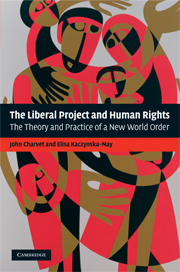Book contents
- Frontmatter
- Contents
- List of abbreviations
- Preface
- Introduction: what is liberalism?
- Part I Liberal beginnings
- Part II The UN regime on human rights
- Part III Critique and defence of liberalism
- 9 Western critiques of liberal human rights
- 10 Liberalism and non-Western cultures
- 11 In defence of liberalism
- Notes
- Index
9 - Western critiques of liberal human rights
Published online by Cambridge University Press: 04 June 2010
- Frontmatter
- Contents
- List of abbreviations
- Preface
- Introduction: what is liberalism?
- Part I Liberal beginnings
- Part II The UN regime on human rights
- Part III Critique and defence of liberalism
- 9 Western critiques of liberal human rights
- 10 Liberalism and non-Western cultures
- 11 In defence of liberalism
- Notes
- Index
Summary
We have been presenting the liberal project as both a distinct theory and a practice of political association. This project has become the dominant ethic in the West and has taken fairly effective root in some non-Western countries and also, officially, in the UN. Yet there have been and still are many who reject liberalism's beliefs and values on principled grounds. In this final part of the book, we aim to identify the main theoretical opposition to rights-based liberalism in Western and non-Western intellectual traditions and to provide reasons to rebut such criticisms and for everyone to commit to the liberal project.
In this chapter, we will discuss the utilitarian, communitarian, Marxist and authoritarian arguments against liberal human rights. While differing substantially among themselves, of course, they do share a basic objection to the idea of human rights. This is the view that the attribution of human rights to individuals involves the untenable belief that individuals possess these rights absolutely and independently of considerations of the collective good. These critics differ over what they emphasize are the implications and consequences of this untenable belief, but their objections have to do with the way in which absolute and independent possession of rights misconstrues the proper relation of individuals to each other and to the common good.
The answer to these critics is to show that the view attributed to human rights theorists is not one that they have to hold or indeed that they should hold.
- Type
- Chapter
- Information
- The Liberal Project and Human RightsThe Theory and Practice of a New World Order, pp. 291 - 317Publisher: Cambridge University PressPrint publication year: 2008



